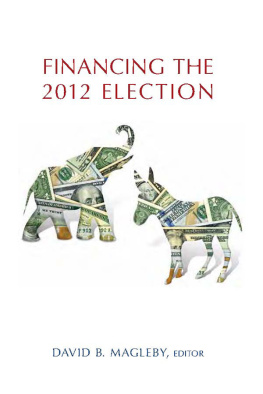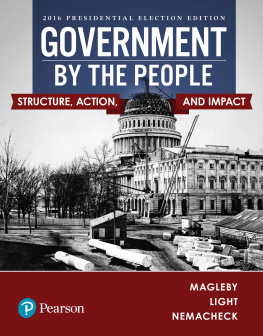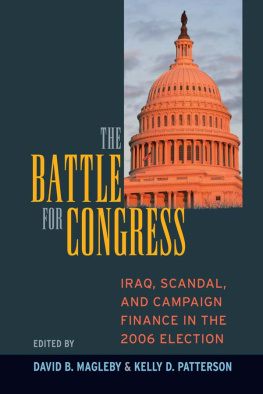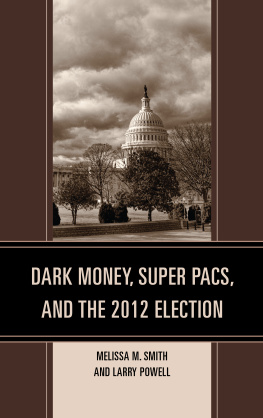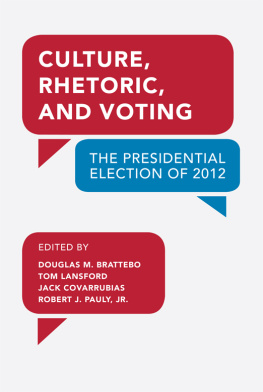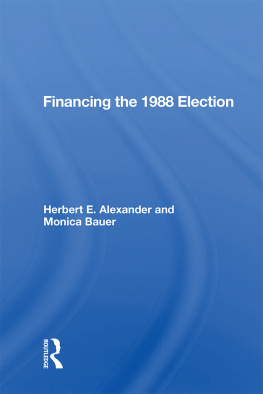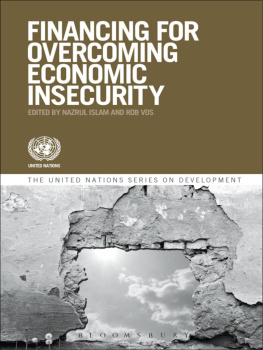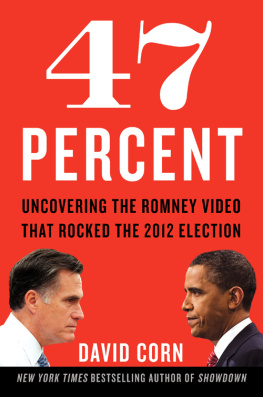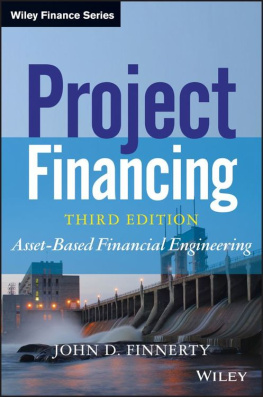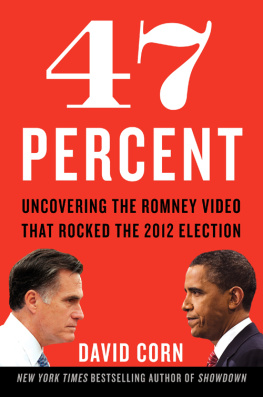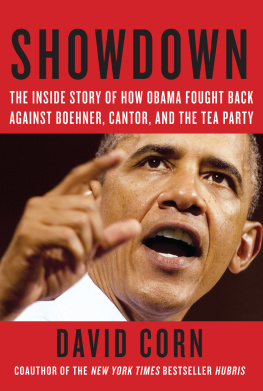Copyright 2014
THE BROOKINGS INSTITUTION
1775 Massachusetts Avenue, N.W., Washington, D.C. 20036
www.brookings.edu
All rights reserved. No part of this publication may be reproduced or transmitted in any form or by any means without permission in writing from the Brookings Institution Press.
The Brookings Institution is a private nonprofit organization devoted to research, education, and publication on important issues of domestic and foreign policy. Its principal purpose is to bring the highest quality independent research and analysis to bear on current and emerging policy problems. Interpretations or conclusions in Brookings publications should be understood to be solely those of the authors.
Library of Congress Cataloging-in-Publication data
Financing the 2012 election / David B. Magleby, editor.
pages cm
Includes bibliographical references and index.
ISBN 978-0-8157-2563-3 (pbk. : alk. paper) 1. PresidentsUnited StatesElection2012Finance. 2. United States. CongressElections, 2012Finance. 3. Campaign fundsUnited States. I. Magleby, David B., author, editor of compilation.
| JK19682012 .F56 2014 |
| 324.9730932dc23 | 2014017120 |
9 8 7 6 5 4 3 2 1
Printed on acid-free paper
Typeset in Sabon
Composition by R. Lynn Rivenbark
Macon, Georgia
Preface
Much has changed since Herbert Alexander published a book summarizing how the 1960 election was financed. Since that 1960 volume, we have seen major federal legislation on the rules of campaign finance, important court cases on the constitutionality of those reforms, and creative political professionals testing the limits of what can be done in raising and spending money to elect or defeat candidates. The pace of change in campaign finance has accelerated and the ability of the participants to adapt to new rules has been remarkable. Despite these significant changes, the importance of money in our democracy has remained constant. Financing the 2012 Election is the fifteenth book that continues Alexander's commitment to document and analyze how American elections are financed.
During the 2012 election cycle we saw a new entity emerge in a presidential election, the independent expenditure-only committee or Super PAC, which grew out of court cases and Federal Election Commission rulings. We also saw growth in the Section 501(c) committees, which are not required to disclose their donors. In some respects, 2012 was reminiscent of the 1996 and 2000 election cycles where interest groups and party committees spent money for and especially against candidates, but technically not in coordination with them. In each of these elections some of the sources of these funds were not disclosed. The expanded array of ways participants could legally spend money in the 2012 elections makes campaign finance more complex because different rules apply to different participants and to different recipients of contributions. Some have contributions limits while others do not; some must disclose their donors while others are not required to do so. Some types of coordination are allowed while others, such as coordination with candidates or party committees, are not. In this volume we have attempted to make these distinctions clear and explain their consequences.
The role of individual donors has been enhanced by the 2002 campaign finance reforms in the Bipartisan Campaign Reform Act, which doubled the individual contribution limit and indexed those limits to inflation. In 2012 we saw contrasting strategies by the two major party presidential nominees in response to these changes. Barack Obama cultivated both large and small donors. Mitt Romney placed primary emphasis on donors giving the maximum allowable contribution. Obama's success among small donors was most notable. Individuals were also the most important source of funding for Super PACs, but in this case the contributions were unlimited and a small number of donors gave the most money. While political parties and interest groups continue to play important roles, especially in congressional elections, a big part of the story in the 2012 presidential election was the extent to which candidates were reliant on Super PAC helpsomething that may become more common in congressional races as well.
As in prior editions, chapter authors bring a wealth of expertise to their chapters. Anthony Corrado provides an insightful summary of campaign finance law and administrative rulings that set the stage for the 2012 election. The presidential nomination phase in 2012 had an unchallenged incumbent seeking renomination but a contested battle for the Republican Party nomination. John Green, Michael Kohler, and Ian Schwarber examine this phase, showcasing the relative success of the candidates in fundraising but also the role played by Super PACs. Though the Democratic primary was uncontested, both the Obama campaign and Obama's Super PAC were active in raising money and advertising during that cycle. Candice Nelson's chapter on the presidential general election insightfully highlights the contrast between the two candidates in campaign strategy. For instance, Romney relied more on large donors, his party, and his Super PAC while Obama had greater success with individual donors at all levels, and especially small donors. Nelson emphasizes the likely continuing role of Super PACs as a replacement of public financing, which no major candidate accepted for the 2012 election cycle.
Congressional elections feature wide variation in the ability of challengers to mount visible campaigns. In their chapter, Paul Herrnson, Kelly Patterson, and Stephanie Curtis provide data and analysis on how incumbents, challengers, and open seat candidates financed their campaigns. Outside groups were also part of the story in congressional races in 2012, including substantial activity by party committees through independent expenditures in battleground races. Some had speculated that by banning soft money, the Bipartisan Campaign Reform Act of 2002 would greatly reduce the role parties play in elections. However, party committees have substituted hard-money funded independent expenditures for much of what they once did with soft money. Diana Dwyre and Robin Kolodny then assess the role of party committees in 2012 and also the possible further expansion of parties thanks to the recent McCutcheon v. Federal Election Commission decision in 2014. Long before the advent of Super PACs, interest groups were important in funding elections. Jay Goodliffe and I discuss the role of traditional PACs as well as Super PACs and Section 501(c) organizations in our chapter on interest groups in 2012. Finally, Tom Mann concludes the book by looking at lessons for reformers that can be drawn from the 2012 election.
I am grateful for the financial support provided to this project by the John D. and Catherine T. MacArthur Foundation where program officer Jeff Ubois was most helpful. Financial support for the project also came from Brigham Young University. Once again this volume greatly benefited from the assistance of Stephanie Perry Curtis who is skilled at navigating the complex data sets at the Federal Election Commission. The project also benefited from a capable team of BYU undergraduate research assistants, specifically Troy Anderson, Zachary Barrus, Ethan Busby, Geoff Cannon, Kenneth Daines, Bree Gardner, Kirsten Hinck, Katie Kleinert, Luke MacDonald, Robbie Richards, and Tessa Sheffield. At BYU, editorial assistance was provided by Kim Greenberg, and grant management support was provided by Gary Reynolds at the Office of Research and Creative Activity, Kathleen Rugg in Research Accounting, Marilyn Webb in the College of Family, Home, and Social Sciences, and Kellie Daniels in the Department of Political Science.

